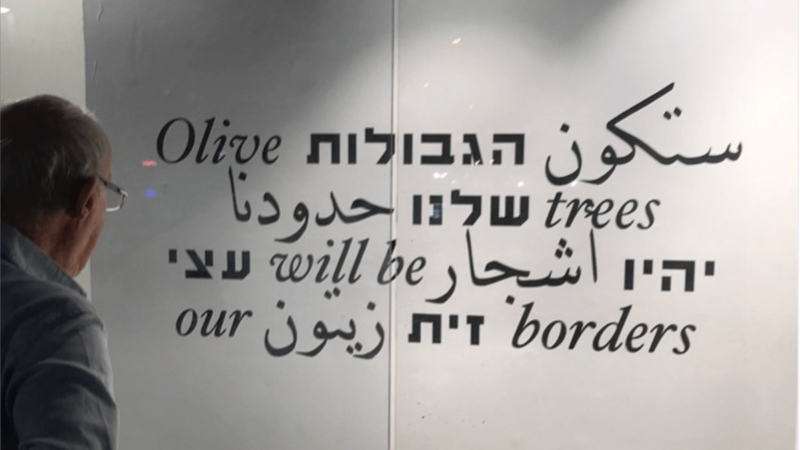How to Peacefully NOT Divide the Land of Israel/Palestine
By Paul Scham
My Israel Horizons colleague and friend Ron Skolnik, in his neighboring column in this issue (page 4), has shown how “blind love” of the whole Land of Israel can sway even dovishly inclined Israelis to overlook what is, by any serious metric, a long-lasting and brutal occupation. However, there is a policy choice, which I support strongly, that can obviate the need for Jews giving up access to and even residence in the West Bank in pursuit of peace. But first, before I explain it, I suggest you read Ron’s column, if you haven’t already, to see what the issue is.
I should emphasize that I totally agree with Ron that the occupation must not be sugar-coated by claiming, since there is a historic Jewish claim on the West Bank, it isn’t “really” an occupation. However, there is a solution, a variant of the Two State Solution which I call Two States 2.0, and which provides a realistic end run around the fact that two nations both love and claim the whole Land of Palestine/Israel. That solution is Confederation, and it is real, realistic, and, in my view, provides the best available alternative to the politically unreachable 2SS, as well as the disaster that a 1SS would lead to.
Confederation has generally been condescendingly overlooked as a practical solution to the conflict both because it has not really been understood, and has often been confused with “One State.” However, it is supported by increasing numbers of Israelis and Palestinians through A Land for All. Check it out.
What is a Confederation? I’m glad you asked. According to the Oxford English Dictionary, it is a “union of sovereign groups or states united for purposes of common action.” Scholars differ on which real world governance systems actually fit that (Benelux, Belgium, and Switzerland are often mentioned), but the European Union, better known to most of us, is also often cited as possessing many of its attributes. Clearly a 27-member Confederation that has been around in one form or another for almost 70 years can’t be an exact model, but the EU shows how it could work, however imperfectly.
We Americans usually came across the word for the first time first when we studied the Civil War in junior high (or middle school) and discovered the armies were either Federal and Confederate. The Confederate States of America was proclaiming it believed in states’ rights, i.e., to keep slaves or secede from the federal union (which implies a stronger bond).
Moving our attention back to the Middle East, Confederation would mean that the sovereign state of Palestine and the sovereign state of Israel would be separated at the venerable Green Line, but would agree by treaty to give up some of their sovereignty to a joint government carrying out various tasks, such as the military, fiscal and monetary policy, and foreign affairs generally. Some form of veto power would be held by each state under certain circumstances. Palestine would be sovereign east of the Green Line; Israel to the west. Jerusalem would be shared.
A shared Jerusalem is common to many peace plans, but the beauty of Confederation is where it differs from the classical 2SS and really shows it’s 2.0. Yair Golan and Yitzhak Herzog could visit the West Bank (“Judea and Samaria”) all they want; in fact they could even live there if they agreed to accept being governed by the State of Palestine. More importantly, settlements (the political and practical weakness with the 2SS, which Ariel Sharon planned for in the 1980s) could remain under the same condition. Likewise, Palestinians could live in Israel, subject to local and national Israeli law. Obviously the conditions for living in the “other’s” land would have to be spelled out in the founding treaty. This is how the European Union works; any citizen of the EU can live anywhere in it but becomes a citizen only by satisfying local law, which they usually don’t, because it’s usually both difficult and unnecessary.
One other aspect might surprise people; a Right of Return would be extended to both Jews and Palestinians. Of course this might have to be conditioned on the willingness and ability of both states to absorb these immigrants. Back in 2000 a poll conducted by a highly regarded Palestinian pollster found only 10% of the Palestinian diaspora would really want to “return” to Palestine. The comparable figure today is unknown.
What makes Confederation fundamentally different from the One State “Solution” is that Israelis (including Israeli Palestinians and their descendants) would vote in Israel, no matter where they live. Likewise, Palestinians would vote in Palestine, regardless of where they reside, except for those who are born with Israeli citizenship, or whom Israel agrees to accept, such as through marriage.
The reason goes back to Yair and Yitzhak. The Jewish people does not claim just half of the Land of Israel (or even the 78% wast of the Green Line); both the holiness and history of the Land are indivisible. Nor do Palestinians claim only 22% of Palestine, nor half, but the whole thing. Many Muslims believe all of Palestine constitutes a Muslim wakf, or charitable endowment, for the benefit of all Muslims. And, ironically, Palestinians lived largely on the plains, while ancient Israelites were predominantly in the hills.
There are many other aspects of Confederation but there’s one that is central—and it is currently in very short supply; everywhere, it seems. That is Trust, of course. And Trust is just as necessary for a One or Two State Solution, which is why Oslo never got off the ground, and the occupation continues. No one expects a sudden pandemic of Trust to break out. So how can Confederation possibly work?
There are no guarantees. However, Palestinians and Israelis both get more through Confederation than through any other peace plan I’ve ever heard of:
Is it unrealistic? Perhaps. But it’s no more unrealistic than any other plan, including the current situation. Can Israelis really believe that Palestinians will consent to the occupation indefinitely? There would unquestionably be periodic wars, which Israelis (used to) refer to mockingly as “cutting the grass.” Israel has become much less used to casualties in recent years; “spoiled” by the comparatively safe period they’ve been living in (except for covid, of course). What happens when Hamas gets truly unlucky, and one of its unaimed (or aimed) rockets hits a school or apartment building? Of course Israel will retaliate disproportionately, but has that ever kept a people down permanently? Of course not.
Either trust or force will have to govern Israeli-Palestinian relations. Trust can be built, admittedly slowly; perhaps only when the two sides realize the alternative is worse. And while trust is being built, I believe it will become apparent that the best—perhaps the only—way of providing the most of what each side wants is through some form of Confederation.
The biggest problem is the time it will take. Israeli life is not bad now. Asking Palestinians to endure occupation for decades is very far from ideal. I frankly don’t have an answer for that. But neither does any advocate for any other plan.
Partners for Progressive Israel remains a strong supporter of the two-state solution. But we are also supportive of the work of A Land for All, which many of us consider an improved version of the 2SS.
So Ron, perhaps Yair and Yitzhak are ahead of their time, not behind. All they have to do is utter a single word: Confederation!
Sincerely,

Paul Scham

Paul Scham is President of Partners for Progressive Israel and the Director of the Gildenhorn Institute for Israel Studies at the University of Maryland.






2SS is clearly a dead letter no matter how often well meaning groups like APN and J Street try to flog it. Confederation will be difficult, but it’s the only viable alternative to a de facto apartheid one state and constant warfare.